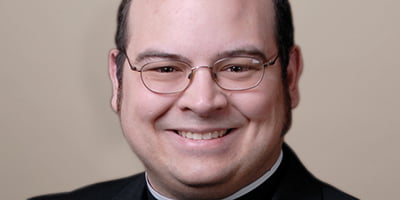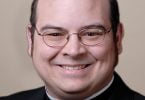For years, I have known that I am called to become a saint
by Father Andrew Strobl
It’s my vocation. Of course, it’s not just my vocation. Becoming a saint is the universal vocation. It has been emphasized over and over that we are all made to become saints — to live with God now and forever in heaven. Sainthood is not meant for a few, it is meant for the many. If someone asked me today what my goal in life is, the best answer I can think of is, “To be a saint!”
Becoming a saint sounds really good, but what does it look like? If saints are the ones that the church has declared are in heaven, what does it take to get to heaven? Jesus was asked that very question by a scholar of the law and gave a clear answer. “Teacher, what must I do to inherit eternal life?” Jesus said to him, “What is written in the law? How do you read it?” He said in reply, “You shall love the Lord your God with all your heart, with all your being, with all your strength, and with all your mind; and your neighbor as yourself.” He replied to him, “You have answered correctly; do this and you will live” (Lk 10:25-28).
Saints are the ones who loved God and their neighbors. We cannot truly do one without the other. We cannot simply be disciples concerned only with love of God, or missionaries concerned only with love of neighbor. We must be both. Pope Francis calls this being a “missionary disciple.” Becoming a saint looks like being a missionary disciple. Missionary discipleship is not meant for a few, it is meant for the many.
Pope Francis explains in “Evangelii Gaudium”: “In virtue of their baptism, all the members of the People of God have become missionary disciples (cf. Mt 28:19). All the baptized, whatever their position in the church or their level of instruction in the faith, are agents of evangelization, and it would be insufficient to envisage a plan of evangelization to be carried out by professionals while the rest of the faithful would simply be passive recipients. The new evangelization calls for personal involvement on the part of each of the baptized. Every Christian is challenged, here and now, to be actively engaged in evangelization; indeed, anyone who has truly experienced God’s saving love does not need much time or lengthy training to go out and proclaim that love.
“Every Christian is a missionary to the extent that he or she has encountered the love of God in Christ Jesus: we no longer say that we are ‘disciples’ and ‘missionaries,’ but rather that we are always ‘missionary disciples’” (120).




